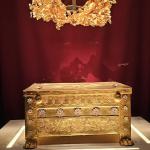What Was the Message of Jesus?
In my last post, I discussed Jesus’ rather elliptical response to James and John when they ask to sit alongside him in his glory. “You do not know what you are asking,” he says. “Are you able to drink the cup that I drink?” (Mark 10:38). The cup, following Old Testament usage, stands for God’s wrathful judgment upon sin. Jesus will drink the cup, bearing this judgment by suffering and dying. This, he believes, is part and parcel of his messianic calling, and necessary if the kingdom of God is to come in its fullness.
Jesus’ reference to the cup reminds us of another crucial incident in his ministry, one that perhaps more than any other reveals his own understanding of his imminent death. This incident, of course, is what we call The Last Supper: Jesus’ last meal with his disciples before he is betrayed and crucified.
In the Gospel of Mark, this final meal occurs on the occasion of the Passover, the great Jewish feast that commemorates the Exodus, when God delivered the Jews from bondage in Egypt. Jesus eats this meal, not with his natural family as would be typical, but with his “kingdom family,” if you will, his closest disciples. Here is Mark’s description of the key moments of this feast:
While they were eating, he took a loaf of bread, and after blessing it he broke it, gave it to them, and said, “Take; this is my body.” Then he took a cup, and after giving thanks he gave it to them, and all of them drank from it. He said to them, “This is my blood of the covenant, which is poured out for many. Truly I tell you, I will never again drink of the fruit of the vine until that day when I drink it new in the kingdom of God.” (Mark 14:22-25)

It’s all to easy for Christians to miss the potential scandal of Jesus’ action. He and his followers are remembering God’s salvation of Israel from Egypt, not to mention God’s faithfulness to his people throughout the ages. Jesus, as host, is directing the meal, when he makes a most unexpected pair of assertions. “This is my body” and “This is my blood of the covenant.” Until that moment in history, the Passover was preeminently about God, and secondarily about Israel. But now Jesus, an apparently faithful Jewish man leading a celebration of the Passover, says in so many words: “Really, this is all about me!” Astounding! Shocking!
If you have a hard time relating to the apparent offense of these statements, suppose that this Sunday when I celebrate communion at Laity Lodge, instead of saying to the people, “This is the body of Christ, broken for you,” I were to say, “This is my body, the body of Mark Roberts. Here is God’s salvation, in me.” Blasphemy, you say!? Indeed! My future as Senior Director of Laity Lodge would suddenly be in jeopardy, I can assure you.
Yet this is more or less like what Jesus was doing with the Passover. Either he was struck by a fit of megalomania, or he was somehow telling the startling truth of his life and mission. Even as Passover was all about God’s salvation of Israel, now that salvation was being embodied in Jesus himself.
Jesus refers to the cup of wine as “my blood of the covenant, which is poured out for many” (Mark 14:24). This is an allusion to the story in Exodus 24, where the people of Israel endorse God’s covenant. Then Moses, having sacrificed many animals, “took the blood and dashed it on the people, and said, ‘See the blood of the covenant that the LORD has made with you in accordance with all these words’” (24:7-8). The new covenant will be ratified with blood, but in this case with the spilled blood of Jesus, who, like the lambs sacrificed in the first Passover, will give his life so that God’s people might be spared.
Jesus wasn’t the first one to connect the blood of the covenant with the coming of God’s kingdom. In fact the prophet Zechariah made this same connection in a passage we associate with Jesus’ triumphal entry into Jerusalem:
Rejoice greatly, O daughter Zion!
Shout aloud, O daughter Jerusalem!
Lo, your king comes to you;
triumphant and victorious is he,
humble and riding on a donkey,
on a colt, the foal of a donkey.
He will cut off the chariot from Ephraim
and the war horse from Jerusalem;
and the battle bow shall be cut off,
and he shall command peace to the nations;
his dominion shall be from sea to sea,
and from the River to the ends of the earth.
As for you also, because of the blood of my covenant with you,
I will set your prisoners free from the waterless pit. (Zech 9:9-11)
Because of God’s covenant with Israel, which was ratified with the blood of sacrificed animals, God’s king will rule over a global kingdom and God’s people will be redeemed from bondage. Jesus comes as the divinely-anointed king, not at first to lead Israel to victory, however, but to offer his own blood so that the new covenant and God’s universal kingdom might be inaugurated (see also Jeremiah 31).
Through the actions and words of the Last Supper, Jesus says:
Even as God once saved his people from slavery in Egypt, so God is now saving his people from slavery to sin through me.
Even as the blood of lambs once enabled death to “pass over” Israel, so my blood will lead to the forgiveness of sin.
Even as the first covenant was sealed with sacrificial blood, so the new covenant will be sealed through my blood, poured out for many.
I am choosing the way of death, Jesus says, so that the new life of the new covenant may come. My sacrifice will overcome the problem of sin, so that God’s kingdom may be established in all its fullness.
In the last line of The Last Supper in Mark’s Gospel, Jesus himself points to the coming of the kingdom: “Truly I tell you, I will never again drink of the fruit of the vine until that day when I drink it new in the kingdom of God” (14:25). Though Jesus is about to die as a ransom for many, he has hope of a new day, when the kingdom will come and there will be a grand messianic banquet. Yet before this happens, Jesus must fulfill his unique calling by offering his body and blood for salvation.















